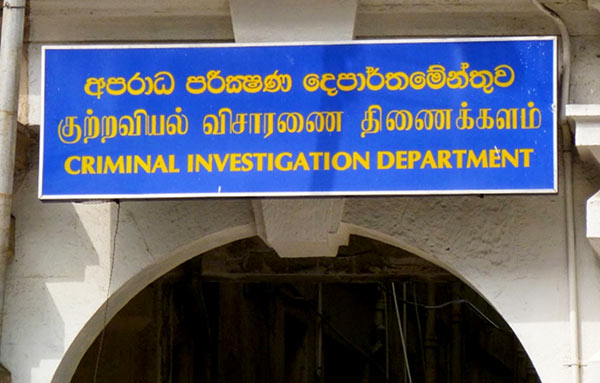CID called in to probe body bag scare

The Criminal Investigation Department (CID) has commenced a probe to trace the persons who allegedly attempted to create social disturbance, and unrest by using a letter by the Ministry of Health seeking 1,000 body bags from the International Committee of the Red Cross (ICRC), to replenish its standard stock.
The letter, dated April 24, 2020, and addressed to ICRC Forensic Coordinator, Angelica Guzman, signed by Additional Secretary (Medical Services) at the Ministry of Health and Indigenous Medical Services, Dr. Sunil de Alwis, was circulated via social media platforms on Sunday, with added captions that the Sri Lankan health authorities were getting ready to dispose bodies, during the ongoing coronavirus pandemic.
Investigators are trying to ascertain whether some trade union members were involved in circulating the letter, with the malicious intention of creating social unrest.
Additional Secretary Dr. Alwis, contacted for comment, said the bags were required to dispose the bodies of people who may die of unidentified causes.
He said that the Ministry had 300 such bags, in Colombo, and they all had been sent to the peripheries. They would be used to dispose the bodies of anyone died of unidentified causes, he said. The bags had no direct connection with coronavirus deaths, he stressed. There had been only seven deaths, so far, from coronavirus, and the bodies of those victims had been cremated, the doctor said.
The issue of sending all 300 body bags to peripheral health centres and the need to replenish the ministry stocks, to maintain inventory, had been raised at a recent meeting where the ICRC representatives were present. The ICRC had said it had the body bags which matched the hygienic standards and could release them to the ministry, free of charge, if it made an official request. It was in response to that the letter had been issued, according to the Additional Secretary.
Dr. Alwis confirmed that he had signed the letter and was not sure how it had leaked. He said he had complained to the Police, on Sunday, and an investigation had been launched to identify those who had leaked a confidential document to the social media.
He also said that a misinterpretation of the letter had resulted in fear being spread among the public.
Dr. De Alwis said that under normal circumstances there occurred about 100 deaths a months in Sri Lanka.
He said that in a pandemic situation the bodies of people, even if they died of other causes, should be disposed in body bags.
As there was a shortage of non-transparent, quality body bags, in Sri Lanka, a request for them had been made to the ICRC.
Director-General of Health Services, Dr. Anil Jasinghe, in a statement yesterday, says that the Health Ministry had requested 1,000 bodybags from the ICRC to maintain its standard inventory and not because it anticipated a high death toll as a result of the present COVID-19 pandemic.
Dr. Jasinghe says that as a result of Sri Lanka’s successful programme to combat COVID-19, the country would not experience a high death toll and adds that measures are in place to prevent the spread of the virus from the clusters which have been detected and isolated.
The Ministry of Health always maintains its inventory at a certain level, including medicines, medical equipment, and body bags. It is a mandatory technical requirement, the DGHS stresses.
The statement says the Ministry of Health was given an opportunity to replenish its supplies with the help of the Coordinating Committee of the International Committee of the Red Cross and, therefore, it was made use of.
Dr. Anil Jasinghe has said it had been a practice for many decades to put the bodies of disaster victims in body bags.
He has said the bodies of the victims of the 2019 April attacks were also put in body bags, and it was an internationally accepted practice.
Therefore, the Director-General of Health Services has said the public need not have any unnecessary fears about the issue.
(Source: The Island – By Norman Palihawadane)
Latest Headlines in Sri Lanka
- Chandrika calls for honest, professional public service February 19, 2026
- Sri Lanka Navy earns USD 598,250 in four months after taking full control of maritime security operations February 19, 2026
- Sri Lanka strengthens crackdown on illegal fishing February 18, 2026
- Former First Lady Maithree Wickremesinghe summoned to FCID February 18, 2026
- Saman Ekanayake released on bail in public funds case February 18, 2026


